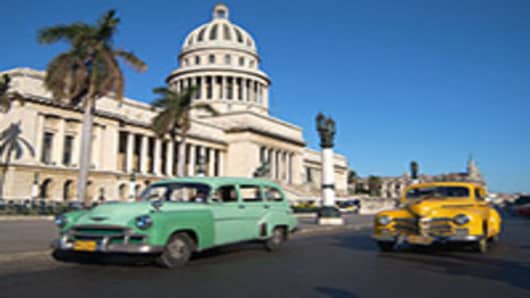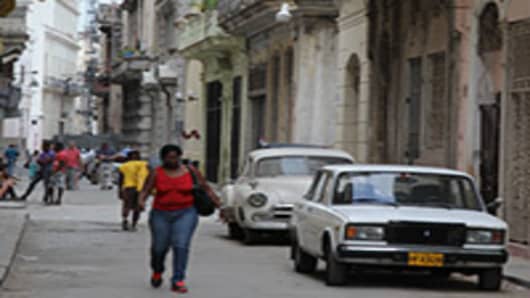HAVANA — Cuba is a surrealist's dream: mile after mile of gorgeous, yet dilapidated architecture; streets dominated by automobiles from the 1950s, filled with people on cell (not smart) phones; only 90 miles from the United States and yet a place where people live without the Internet.
On the eve of Pope Benedict XVI's visit to Cuba, journalists from all over the world are descending en masse on this Communist island for the first time in a decade. The last event where so many reporters (American in particular) were allowed in at the same time would have been former President Jimmy Carter's visit in 2002.
Thus the papal visit is providing a rare opportunity to see first hand the economic state of one of the last bastions of socialism, and whether or not a few new market-oriented laws are the start of meaningful change.
Additionally, journalists and Cubans themselves want to know if long-time, now-retired dictator Fidel Castro will appear in public. Old age and illness forced Castro to hand over power to his brother Raul in 2006. But his persona is still ever-present here, even as more and more Cubans talk about him in the past tense.
Under Raul Castro, two changes to Cuban law were introduced late last year: the ability to buy and sell homes and cars, and the right to be self-employed in a limited number of fields. These steps may seem infantile in a world dominated by market-oriented economies, where even "communist" China appears to be racing toward capitalism. But for this nation they are significant.
Until now, every aspect of the economy was controlled by the government. Every restaurant, every barber shop, every hotel, every TV and radio station, was operated by the state. From real estate development to the nation's utilities, all were (and for the most part still are) decided and controlled by bureaucrats.
This state of affairs started in 1959 when Fidel Castro took power in a rebel coup. Slowly but surely he began seizing all foreign business, then local businesses, until he finally achieved full control of every sector of the economy, all in the name of communism. While most communist strongholds have since fallen, most-notably the Soviet Union, Cuba still clings to the idea of state control.
Yet, with the above-mentioned reforms begun just four months ago, there is now a fledgling real estate market. In a country with no classified advertising and no real estate agents, individuals post signs on trees advertising they are selling their homes.
On Camino del Prado, in a spot historically used for announcements, there were postings this week for five different homes for sale. One said: "I'm selling my historic apartment. Three bedrooms, two baths, views of the sea, hot and cold water, gas. 70,000 convertible pesos." That's roughly $80,000. "Gas" refers to pre-installed gas lines, meaning no need for a propane tank in the house when it comes to cooking.
A 65-year old man named Eduardo just sold an apartment for the equivalent of $17,000. He told CNBC he didn't need it any more because he was moving in with his new wife and her parents and children who have a much larger home. (There is a chronic shortage of housing in Cuba, and so many single-family homes now house at least three generations.) He was very happy about the transaction, but seemed circumspect in his discussion about it. Getting the money "resolved several problems" he said, including needed repairs for his new home.
He also used the money to buy a shiny new microwave, deep fryer and rice cooker. The rest will go into savings for now, but he hopes to start a diner so that the money will grow.
Before these changes, he wasn't allowed to sell the apartment even though he "owned" it. When Castro came to power, he told all the country's renters that they didn't have to pay rent anymore, that they were now owners of their properties. But without the ability to sell an asset such as a home, the word "ownership" becomes far less meaningful.
The new law allowing self-employment defines 181 categories where it is now permissible to work for yourself. Embroiders, masons, locksmiths, private nurses, clowns for kids parties, electricians and auto mechanics can now offer their services and get paid directly. Many of these activities were already happening, but on the sly. This law now makes it legal to do so, with the downside that now those individuals have to pay a tax on their revenues.
However, the new law has given life to a budding group of restaurateurs.
Miguel Angel Morales has a two-story restaurant, La Moneda Cubana, in touristy old Havana where he is able to charge new-world prices because of its grand interior, quality food and, importantly, good service. While government-run restaurants have traditionally had poor service, his wait staff is at the ready, eager to do well because they know they'll get tips from tourists.
"I am thrilled to be continuing in a business that my grandfather once did and working for myself," he told me during an interview for the CNBC half-hour special "Cuba: Forbidden Fortune."
Cuba's economy appears to be in better shape than it was 10 years ago. But better doesn't mean good. There are far more (old) cars on the road than in 2002, beneficiaries of Venezuelan President Hugo Chavez' largesse. He provides at least 50,000 barrels of oil per day to the island under favorable financing, and some reports put the number as high as 115,000 — which allows for far greater availability of cheap gasoline and fuel for the island's power plants.
Many want to see these moves as the first steps toward a market economy — much akin to what China began doing in the early '80s. But representatives of the government say that is absolutely not the case. In meetings with journalists, Cuban diplomats say they are in no way abandoning socialism, rather they are "perfecting the model" and trying to reduce inefficiencies.
Skeptics don't believe this is a move toward capitalism either. The University of Miami's Jose Azel, a Cuban exile, says these are being done to reduce the pressure on the state coming from an unhappy and frustrated society. For a country to develop economically, it needs to export, he says.
"It needs to earn currencies by exporting. None of these activities are going to contribute in any way, shape or form," Azel said. "In other words, serious economic change is just simply not there. These are measures designed to reduce the government's payroll to allow them to remain in power, but they're not going to bring economic development to Cuba."
In 2002, rice cookers, air conditioners and many other electrical appliances were prohibited in parts of the island because they caused too much strain on the power grid. But now, blackouts are less common, and with the help of families living in the United States, many have large screen TVs, DVD players, and other electronics that were once rarities.
Anecdotal evidence is the only kind available because official statistics are not reliable, if they even exist at all. Some data, like the country's balance of payments, haven't been published in more than 10 years. Some years the country releases tourism revenue figures. Sometimes it doesn't.
Internet service is nearly nonexistent. Officially the government says more than 1 million residents have access to it, out of a total of 11 million people. You must work in certain professions to be allowed access. The government has told the people that this is only due to lack of capacity — right now they can transmit data only via satellite. But there are plans for a fiber-optic cable between Cuba and Venezuela, and with it the promise of more being allowed to surf the net.





